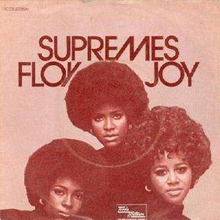"Someday We'll Be Together" is a song written by Johnny Bristol, Jackey Beavers, and Harvey Fuqua. It was the last of twelve American number-one pop singles for Diana Ross & the Supremes on the Motown label. Although it was released as the final Supremes song featuring Diana Ross, who left the group for a solo career in January 1970, it was recorded as Ross' first solo single and Supremes members Mary Wilson and Cindy Birdsong do not sing on the recording. Both appear on the B-side, "He's My Sunny Boy".

"Stoned Love" is a 1970 hit single recorded by The Supremes for the Motown label. It was the last Billboard Pop Top Ten hit for the group, peaking at number seven, and their last Billboard number-one R&B hit as well, although the trio continued to score top ten hits in the UK into 1972. In the UK, it was the post-Ross Supremes' biggest hit, reaching number 3 in the singles chart. The single spent six weeks in the UK top ten and five weeks in the US top ten. The BBC ranked "Stoned Love" at number 99 on The Top 100 Digital Motown Chart, which ranks Motown releases solely on their all time UK downloads and streams.

"Up the Ladder to the Roof" is a 1970 hit single recorded first by The Supremes for the Motown label. It was the first Supremes single to feature new lead singer Jean Terrell in place of Diana Ross, who officially left the group for a solo career two weeks before the recording of this song in January 1970. This song also marks a number of other firsts: it is the first Supremes single since "The Happening" in 1967 to be released under the name "The Supremes" instead of "Diana Ross & The Supremes", the first Supremes single solely produced by Norman Whitfield associate Frank Wilson, and the first Supremes single to make the United Kingdom Top 10 since "Reflections" in 1967.
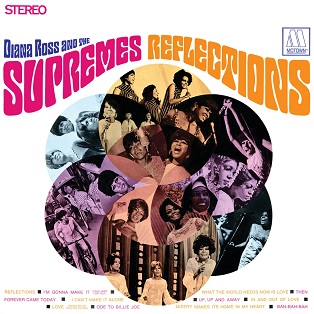
Reflections is the twelfth studio album recorded for Motown by Diana Ross & the Supremes. Released in 1968, it was the first regular studio LP to display the new billing of the group formerly known as "The Supremes." It contains the singles "Reflections", "In and Out of Love" and "Forever Came Today". Also included are covers of songs made famous by Martha and the Vandellas and The 5th Dimension. Also present are songs written by other famous names, including "Bah-Bah-Bah" co-written by Motown singer Brenda Holloway with her younger sister, Patrice, an original Smokey Robinson composition titled "Then", and "What the World Needs Now Is Love" by Burt Bacharach and Hal David, which Motown planned to release as a single in the spring of 1968, but cancelled. It also contains a cover of Bobbie Gentry's "Ode to Billie Joe," whose original recording kept the single #2 "Reflections" from peaking at the top spot on the Billboard Hot 100 in September 1967, and it hit #2 on Cashbox.

"Love Is Here and Now You're Gone" is a 1967 song recorded by the Supremes for the Motown label.

Right On is the nineteenth studio album by The Supremes, released in 1970 for the Motown label. It was the group's first album not to feature former lead singer Diana Ross. Her replacement, Jean Terrell, began recording Right On with Mary Wilson and Cindy Birdsong in mid-1969, while Wilson and Birdsong were still touring with Ross.
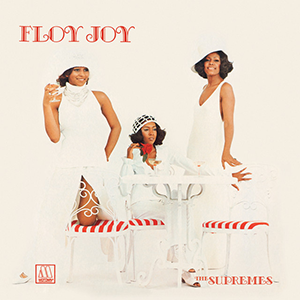
Floy Joy is the twenty-fifth studio album released by The Supremes on the Motown label. This was the only Supremes album solely produced and arranged by Smokey Robinson and included the U.S. top 20 hit, "Floy Joy" and the U.S. top 40 hit, "Automatically Sunshine", both of which were top 10 hits in the U.K.

"Love Is Like an Itching in My Heart" is a 1966 song recorded by the Supremes for the Motown label.

"Forever Came Today" is a 1968 song written and produced by the Motown collective of Holland–Dozier–Holland, and was first made into a hit as a single for Diana Ross & the Supremes in early 1968. A disco version of the song was released as a single seven years later by Motown group the Jackson 5.

"Nothing but Heartaches" is a 1965 song recorded by The Supremes for the Motown label.

"Automatically Sunshine" is a song written by Smokey Robinson and released as a single by Motown singing group The Supremes as the second single from their popular album Floy Joy in 1972.
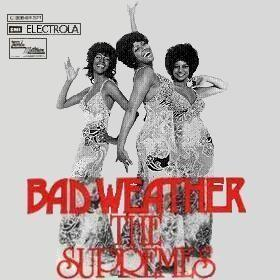
"Bad Weather" is a song recorded and released as a single by Motown vocal group The Supremes in 1973. It was composed by Stevie Wonder and Lynda Laurence's brother Ira Tucker Jr., and produced by Wonder. The song was Jean Terrell's last charted single as lead singer of the Supremes and the second and last time Laurence was featured on a Supremes single.

"I'm Gonna Let My Heart Do the Walking" is a disco-styled soul single composed by the Holland brothers Eddie and Brian, members of the former Holland–Dozier–Holland team and was released as a single by Motown vocal group The Supremes in 1976 on the Motown label. It was the first single since "Your Heart Belongs to Me" in 1962 to feature four Supremes. It is also notable for being the last top forty single the group would score before they disbanded in 1977.
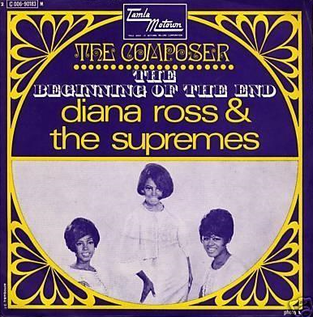
"The Composer" is a 1969 song released for Diana Ross & the Supremes by the Motown label.

"I'll Try Something New" is a song written by Smokey Robinson and originally released in 1962 by The Miracles on Motown Records' Tamla subsidiary label. Their version was a Billboard Top 40 hit, peaking at #39, and just missed the Top 10 of its R&B chart, peaking at #11. The song was released later as a joint single by Diana Ross & the Supremes and The Temptations, also becoming a charting version on the Billboard 100 pop singles chart, peaking for two weeks in April 1969 at number 25.

"Everybody's Got the Right to Love" is a socially conscious–inspired pop song written by Lou Stallman, produced by Frank Wilson and released as a single in 1970 by Motown group The Supremes, who took the song into the top forty in mid-1970 following the release of "Up the Ladder to the Roof".

"Touch" is a soft ballad written by Pamela Sawyer and Frank Wilson, who also produced it as a single for Motown recording group The Supremes, who issued it as a single in 1971.

“You Gotta Have Love in Your Heart” is a duet single between Motown singing groups The Supremes and the Four Tops, released as a single from their The Return of the Magnificent 7 album in 1971. The single became a modest charter peaking at #55 on the U.S. Billboard Hot 100 chart and #41 on the U.S. Billboard R&B Singles Chart. The single fared better in the UK, where it reached #25 in the official top 50 single chart. Lead vocals were by the groups' respective lead singers Jean Terrell and Levi Stubbs.

"Your Wonderful, Sweet Sweet Love" is a song written by Smokey Robinson, recorded in October 1966 by Kim Weston. Her recording was not issued at the time as she left the label over a dispute over royalties in 1967. Weston's original version was first released in 2005.

"He's My Man" is a single released by Motown singing group The Supremes, listed as catalog number M1358F. It is the lead single released from their 1975 self-titled album, The Supremes. The single's peak position was 69 on the US R&B charts, and number-one on the regional Disco charts.
